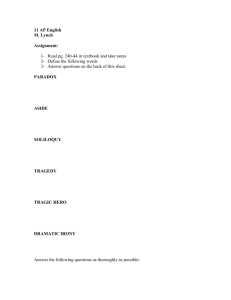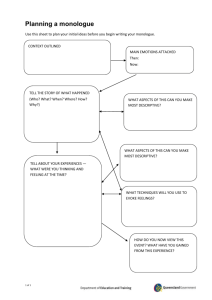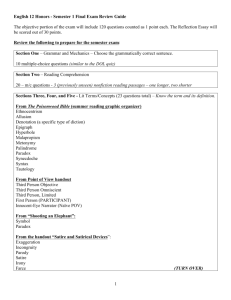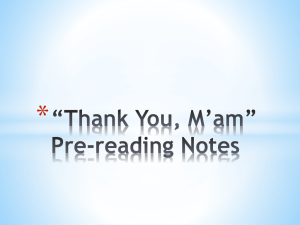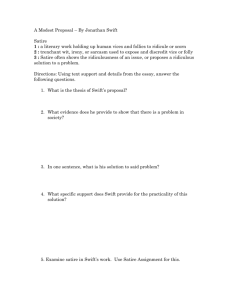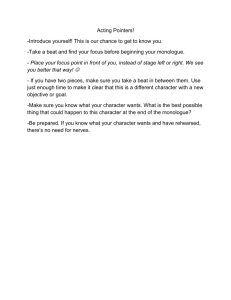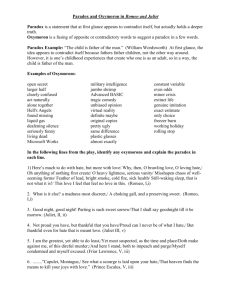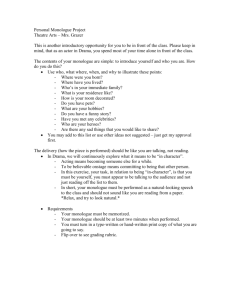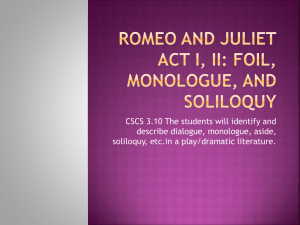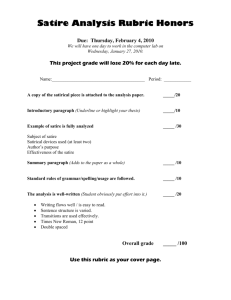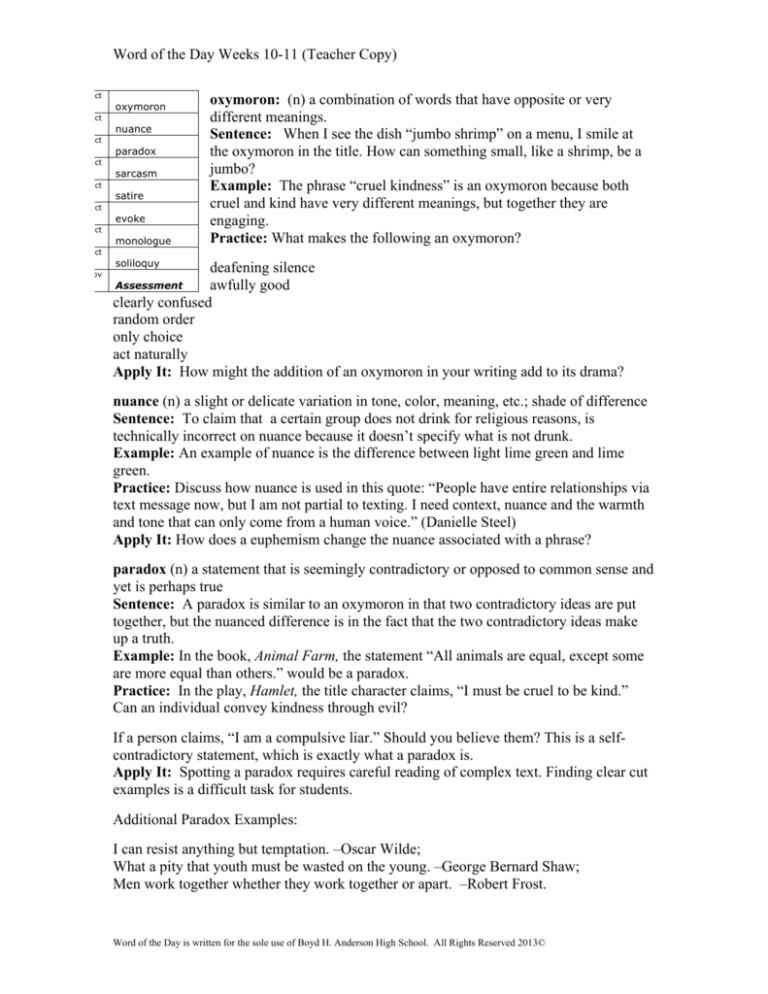
Word of the Day Weeks 10-11 (Teacher Copy)
21-Oct
oxymoron
22-Oct
nuance
23-Oct
paradox
24-Oct
sarcasm
28-Oct
satire
29-Oct
evoke
30-Oct
monologue
oxymoron: (n) a combination of words that have opposite or very
different meanings.
Sentence: When I see the dish “jumbo shrimp” on a menu, I smile at
the oxymoron in the title. How can something small, like a shrimp, be a
jumbo?
Example: The phrase “cruel kindness” is an oxymoron because both
cruel and kind have very different meanings, but together they are
engaging.
Practice: What makes the following an oxymoron?
31-Oct
soliloquy
1-Nov
deafening silence
awfully good
clearly confused
random order
only choice
act naturally
Apply It: How might the addition of an oxymoron in your writing add to its drama?
Assessment
nuance (n) a slight or delicate variation in tone, color, meaning, etc.; shade of difference
Sentence: To claim that a certain group does not drink for religious reasons, is
technically incorrect on nuance because it doesn’t specify what is not drunk.
Example: An example of nuance is the difference between light lime green and lime
green.
Practice: Discuss how nuance is used in this quote: “People have entire relationships via
text message now, but I am not partial to texting. I need context, nuance and the warmth
and tone that can only come from a human voice.” (Danielle Steel)
Apply It: How does a euphemism change the nuance associated with a phrase?
paradox (n) a statement that is seemingly contradictory or opposed to common sense and
yet is perhaps true
Sentence: A paradox is similar to an oxymoron in that two contradictory ideas are put
together, but the nuanced difference is in the fact that the two contradictory ideas make
up a truth.
Example: In the book, Animal Farm, the statement “All animals are equal, except some
are more equal than others.” would be a paradox.
Practice: In the play, Hamlet, the title character claims, “I must be cruel to be kind.”
Can an individual convey kindness through evil?
If a person claims, “I am a compulsive liar.” Should you believe them? This is a selfcontradictory statement, which is exactly what a paradox is.
Apply It: Spotting a paradox requires careful reading of complex text. Finding clear cut
examples is a difficult task for students.
Additional Paradox Examples:
I can resist anything but temptation. –Oscar Wilde;
What a pity that youth must be wasted on the young. –George Bernard Shaw;
Men work together whether they work together or apart. –Robert Frost.
Word of the Day is written for the sole use of Boyd H. Anderson High School. All Rights Reserved 2013©
Word of the Day Weeks 10-11 (Teacher Copy)
sarcasm (n) an ironic or satirical remark that seems to be praising someone or something
but is really taunting or cutting. Sarcasm can be used to hurt or offend or can be used for
comic affect.
Sentence: Sometimes sarcasm is easier to spot when spoken because the tone of voice
might change.
Example: Pick a couple to discuss with students
•
•
•
•
•
•
•
•
•
•
•
•
•
•
"Some cause happiness wherever they go; others whenever they go." - Oscar Wilde
“Sometimes I need what only you can provide: your absence." - Ashleigh Brilliant
"I feel so miserable without you, it's almost like having you here." - Stephen Bishop
"I never forget a face, but in your case I'll be glad to make an exception." - Groucho Marx
"The trouble with her is that she lacks the power of conversation but not the power of speech." George Bernard Shaw
"I didn't attend the funeral, but I sent a nice letter saying I approved of it." - Mark Twain
"Weather forecast for tonight: dark." - George Carlin
"You see, money's not everything in life is it? But it keeps you in touch with your children..." Johnnie Casson
"The early bird may get the worm, but it's the second mouse who gets the cheese." - Steven Wright
"What's on your mind, if you will allow the overstatement?" - Fred Allen
"I always wanted to be somebody, but now I realize I should have been more specific." - Lily
Tomlin
"Reader, suppose you were an idiot. And suppose you were a member of Congress. But I repeat
myself." - Mark Twain
"I like long walks, especially when they are taken by people who annoy me." - Fred Allen
"Children really brighten up a household - they never turn the lights off." - Ralph Bus
Practice: How would tone turn these statements into sarcastic replies?
• When something bad happens - That's just what I need, great! Terrific!
• When you expected something to happen, especially after warning someone about it - Well what a
surprise!
• When someone says something that is very obvious - Really Sherlock, No! You are clever
• When someone does something wrong - Very good, well done, nice!
Apply It: How might the use of sarcasm by a teacher be a trust buster with students?
satire (n) the use of irony, sarcasm and humor to criticize or show the ignorance of
people.
Sentence: A work of literature that mocks social conventions, another work of art, or
anything its author thinks ridiculous could be considered satire.
Example: Here is an example from Family Guy.
“Oh I was not aware that you can see the future Lois, can I go ahead and get
tomorrow's lottery number.” - Peter Griffin
Practice: Romantic comedies often use satire to poke fun at stereotypes or human
weakness. Think about how the characters are satirized in the following movies or shows:
Word of the Day is written for the sole use of Boyd H. Anderson High School. All Rights Reserved 2013©
Word of the Day Weeks 10-11 (Teacher Copy)
Guess Who?
Meet the Fockers
Coming to America
What other movies or television programs use satire with humorous effects?
Apply It: Satire has been used throughout history in all subjects. Who are the satirists in
your content?
evoke (v) to bring a memory or feeling into the mind; to cause a particular reaction or
response to happen.
Sentence: The old house evoked memories of his childhood.
Example: Think about a smiley face, thumbs up, or heart symbol you might receive in a
text. What other “emoticons” can you use to evoke a certain feeling you want to share
through a text?
Practice: Think about emoticons you use to communicate electronically. What
emoticon, or feeling, would the following statements evoke?
The last night my family got together was memorable.
The next class starts in 90 minutes.
Apply It: Which medium is the most powerful for evoking a call to action: images only
(no text or audio), or print only (no images or audio)?
monologue (n) an uninterrupted speech made by one person while in the company of
others
Sentence: Many late night talk shows begin with a comedian’s monologue making fun of
people and current events.
Example: Star Trek, Star Wars, and Person of Interest are examples of shows with
opening monologues.
Practice: What are the lines from the opening monologues of Star Trek, Star Wars, and
Person of Interest?
Apply It: How is a parent lecture like a monologue?
soliloquy (n) the act of speaking one’s thoughts out loud while alone
Sentence: When a character reveals what he is thinking through a soliloquy, we learn
something that other characters in the story might not know.
Example: “To be or not to be” in Hamlet is one of the most famous soliloquies in
literature.
Practice: Here is a list of movies with recognized soliloquies. How many of these scenes
have you seen?
Taxi Driver
“You talking to me?” Robert De Niro
The Shawshank Redemption “Rehabilitated?” Morgan Freeman
V for Vendetta
“Voilà!” from the vaudevillian villain, V.
Can you think of one on your own?
Word of the Day is written for the sole use of Boyd H. Anderson High School. All Rights Reserved 2013©
Word of the Day Weeks 10-11 (Teacher Copy)
Apply It: A monologue and a soliloquy are both alike in that they are both a speech
made by one person. A monologue may be spoken to a person in the room or even the
audience. However, a soliloquy is spoken as if the person was alone.
Word of the Day is written for the sole use of Boyd H. Anderson High School. All Rights Reserved 2013©

